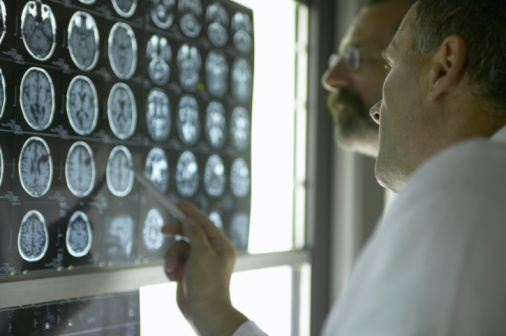
The number of American soldiers suffering from traumatic brain injuries (TBI) continues to rise as soldiers on patrol face the threat of brain injury from shockwaves caused by bomb explosions. Although there is still no helmet that can protect soldiers from such injuries, a new handheld device may help diagnose them more quickly and accurately. When medical crews can diagnose brain injuries early, soldiers receive better treatment and improved outcomes.
Two Potential Technologies under Evaluation
The University of Virginia School of Medicine is working with the U.S. Department of Defense and $6 million[1] in research grants. Researchers hope to understand how and why explosions cause TBI so that they can develop better equipment to protect soldiers and diagnose brain injuries.
The team is using the federal funds to investigate two potential methods for more accurate and efficient TBI diagnoses. Dr. James Stone is the school’s assistant professor of radiology and medical imaging. He is helping to lead the research. “We’re looking at ways to better diagnose TBI with imaging,” said Dr. Stone.
Handheld Ultrasound Devices
One potential solution is a handheld device that measures the density of brain tissue through ultrasound. Emergency medical technicians could use handheld devices, much like those used routinely by obstetricians to gain insight into a woman’s pregnancy.
Brain Tissue Density and TBI
Researchers believe there might be a correlation between tissue density and TBI. If so, they could use ultrasound to determine tissue density in the brain and diagnose injuries early. Before this becomes a viable option, researchers must prove their theories about the connection between TBI and brain tissue density. Not only must they be able to detect brain injuries, even mild conditions must be identifiable with these devices.
Cellular Changes
The second potential device would use cellular probes to diagnose TBI. These devices would offer detailed views of the brain. Today, military hospitals use magnetic resonance imaging (MRI) and computerized tomography scans (CT) to identify brain injuries. Unfortunately, these scans do not provide enough detail to know if a soldier suffered brain injury. Because the brain injury can create a domino effect of dying cells, researchers may be able to reveal injuries by studying changes on the cellular level.
If successful, these new diagnostic techniques may help doctors identify mild TBI cases, which produce subtle changes and are notoriously difficult to diagnose. Such injuries concern doctors greatly because they can lead to a host of subsequent problems such as depression, emotional illness and memory loss.
If a soldier suffers a second brain injury before the first heals, the consequences can be deadly. When doctors learn to identify precisely how shock waves cause brain injury, they can develop better diagnostic tools, protective gear and treatments.
Contact Us
If a serious traumatic brain injury is affecting your life or the life of someone you love, contact our office. Our knowledgeable brain injury attorneys will explain your rights and help you decide if you should file a lawsuit to recover compensation for the injury.


